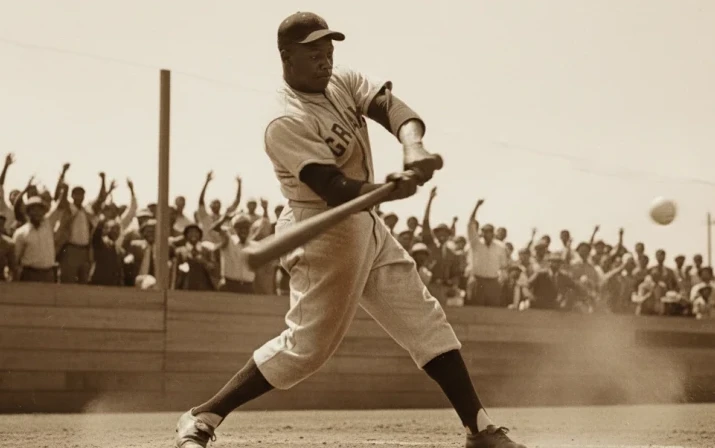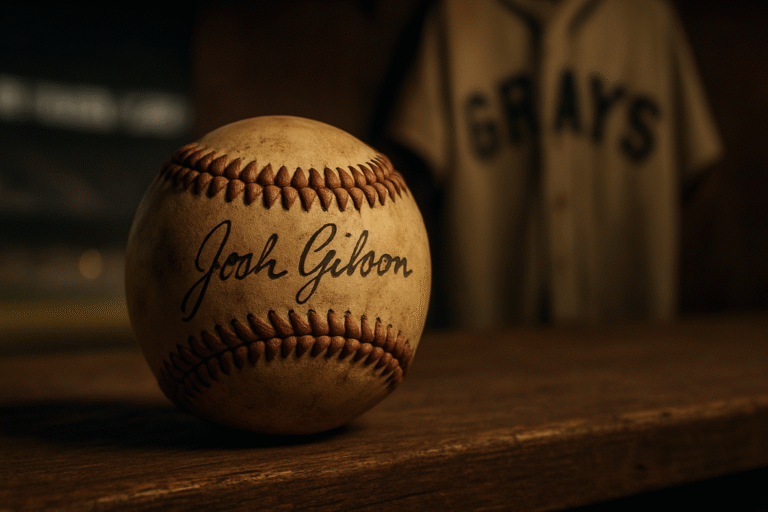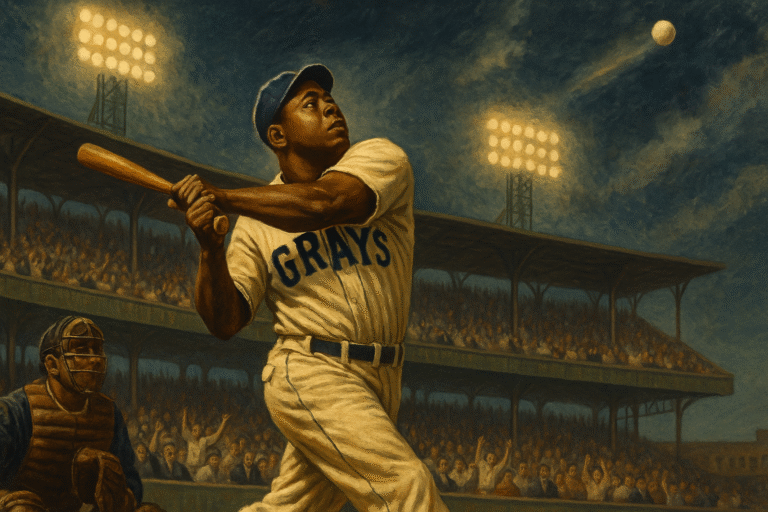
TL;DR — Why Josh Gibson Was That Good
Josh Gibson wasn’t just strong — he paired size, balance, and athleticism with a compact, efficient swing.
- Built for power: 6’1″, 220 lbs, strong legs, stayed balanced through contact.
- Compact swing: short to the ball, no wasted motion, repeatable mechanics.
- Barrel control: found the sweet spot often — that’s why the bat sounded different.
- Power to all fields: could punish inside or drive outside pitches the other way.
- Elite timing: saw the ball early, adjusted to offspeed, even Satchel Paige praised him.
- Modern lesson: clean mechanics + contact first = power that holds up in any era.
That’s why he belongs in every conversation about the greatest hitters, not just the greatest power hitters.
Josh Gibson: What Made His Swing So Unstoppable
Josh Gibson’s name carries weight in any baseball conversation. Talk to anyone who loves the game, and his name almost always comes up with a mix of awe and curiosity. People want to know what made his swing so powerful, and why pitchers feared him.
From what I’ve read and heard over the years, Gibson wasn’t just strong. He was efficient. He combined rare athletic talent with sharp mechanics and a hitter’s mindset that was decades ahead of its time. Let’s break down what really made Josh Gibson one of the greatest hitters ever, and what players today can learn from him.
1. Physical Power with Real Athleticism
The first thing that stands out about Josh Gibson is his size. At 6’1″ and 220 pounds, he looked like a wall with a bat. People said he was “built like sheet metal,” and that description fits. But strength was only part of it.
Gibson wasn’t clumsy or slow. He was balanced, quick, and grounded, all traits that made his swing explosive and repeatable. His lower body did most of the work, driving through each pitch with balance and control. That’s how you generate force that looks effortless.
Modern players could learn from that. It’s not about bulking up at all. It’s more about control, rhythm, and using your body efficiently.
2. A Compact, Fluid Swing That Wasted Nothing
A lot of big hitters fall into the trap of swinging too hard. Gibson didn’t. His swing was short, smooth, and deadly efficient, with no wasted motion.
He stayed “short to the ball, long through it” before that phrase even existed. His hips fired first, his hands stayed tight, and the barrel whipped through the zone at just the right time. It was mechanical poetry.
That’s why he could hit for both average and power—he wasn’t just trying to crush the ball. He was in control. Every part of his motion worked together. Even when he hit bombs, it looked easy.
3. Contact on the Sweet Spot—Every Time
Power means nothing without solid contact, and Gibson was a master at it. Teammates said the crack of his bat sounded like thunder. That’s the sound of hitting the sweet spot again and again.
He could square up anything; inside, outside, high, or low. Pitchers couldn’t find a safe zone against him. That level of consistency doesn’t happen by accident. It takes timing, focus, and precision.
For younger hitters, this is the lesson: power fades, but contact lasts. If you can barrel up pitches like Gibson did, everything else falls into place.
4. Power to All Fields Made Him Unpredictable
Most hitters have a favorite direction. Gibson didn’t. He could pull inside heat or blast outside pitches to the opposite field with equal force.
Pitchers hated that. Once they realized they couldn’t predict where the ball would go, their confidence dropped. Some teams even shifted infielders because he could drive outside pitches to right field as hard as most players pull them left.
This all-fields power made him dangerous—and unpredictable. When you can hit anything, anywhere, you own the plate.
5. Elite Timing and Pitch Recognition
Satchel Paige once said Josh Gibson was the best hitter he ever faced. That says enough.
Gibson’s hand-eye coordination was incredible. He recognized pitches early, adjusted mid-swing, and made tough breaking balls look easy. He didn’t have video analysis or advanced scouting reports—he just saw the ball better than anyone else.
That kind of instinct can’t be taught. It’s the reason he led leagues in both power and average. He waited, read, and attacked. That’s elite hitting.
6. Myths, Challenges, and What We’ll Never Know
We don’t have many videos of Gibson. A lot of what we know comes from stories, and not everyone agrees on the exact details. Some said he choked up in tight spots. Others claimed he widened his stance against certain pitchers.
That mystery adds to his legend. Maybe the truth is that Gibson didn’t follow anyone’s model. He trusted his feel. Some of the best hitters just “get it” in ways you can’t diagram or coach.
And maybe that’s the biggest takeaway because greatness doesn’t always fit the mold.
7. Lessons for Modern Hitters
Even with all the tech and analysis today, the fundamentals haven’t changed. Gibson’s success came down to three timeless things:
- Efficient mechanics
- Consistent contact
- Smart pitch recognition
Young hitters should study him, not for style, but for substance. Watch how he used his body. Notice his control. Focus on balance and timing before chasing launch angles and swing speeds.
Power comes from clean contact. Gibson proved that almost a century ago.
FAQs About Josh Gibson’s Hitting
No. He hit for both power and average. He didn’t just swing for the fences—he punished anything in the zone.
Not much. His fundamentals were sound and would fit right into modern baseball. If anything, his compact swing would look advanced even today.
Master the basics: balance, contact, and timing. Use your natural strengths, but don’t waste motion. Gibson showed that power and precision can coexist when your mechanics are clean.
Final Thoughts
Josh Gibson wasn’t just strong; he was bright, balanced, and precise. His swing was a perfect mix of force and finesse, built on fundamentals that still define great hitters today.
If you’re trying to improve your own game, start where he did: build balance, make consistent contact, and stay disciplined. The rest will follow.
Key Takeaway: Josh Gibson’s power stemmed from balance, precision, and mechanical efficiency, a timeless formula that still defines great hitters today.



